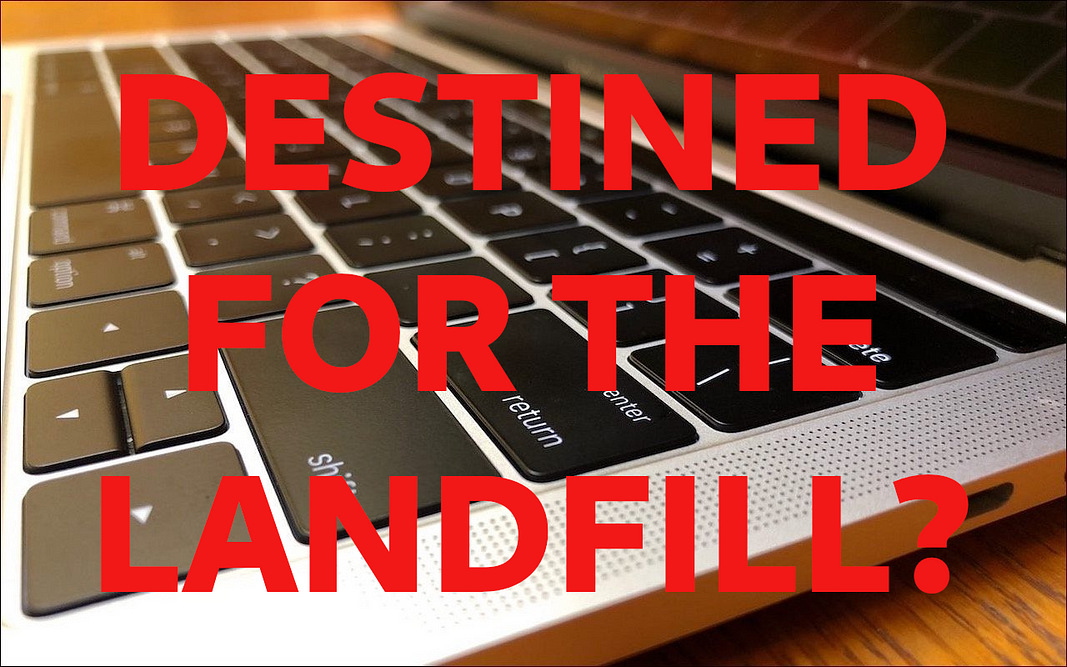
Without official unit sales numbers from Apple, we have no idea how many hundreds of thousands of these machines are in the wild.
I am a life-long fan of Apple. Born in ‘68, I grew up in the thick of the consumer electronics and personal computer boom of the late 70's. Keeping to myself at times, loudly evangelistic at others, a shame-free Mac Ex-pat, reluctant Windows user for a decade, and always the staunch critic, my fandom runs deep. From my early experiences with Apple ][e machines, to all of the Macs I’ve had since, and arriving at now with the two Mac Minis on my desk, one an M1 and the other a last-gen Intel model, I have had my most satisfying and productive years on Macs.
Fortunate for me that I missed Apple’s Butterfly Keyboard era, then.
In case you were unable to dodge that particular bullet and bought yourself one of these cursed machines, you’ll find the following link disappointing (In short, the deadline to participate passed March 6th, 2023):
In a nutshell, the Butterfly keyboards on a range of Macbook, Macbook Pro, and MacBook Air models from 2015 to 2019 were atrocious (SEE: model list below). The fancy new keyboard failed far more frequently than the Magic keyboards that came before, and necessitated costly, complex repairs at Apple service centers to replace the parts, only for them to break again… and again… and again.
At first Apple tried to ignore the problem away, likely thinking they could engineer themselves out of the corner they’d gotten themselves into with later revisions. None of the refinements made any lasting change, however. In the end, Apple offered all owners free fixes for up to four years from purchase, and then settled a Class Action lawsuit brought by a group of very annoyed owners. If you qualified, you’d get up to $395, which isn’t much of a consolation after spending a few thousand bucks (or more) on a laptop with a terminally faulty primary input device.
Sadly, the debut of the temperamental technology also marked the triumphantly tragic return of a 12" model, it’s first since the PowerBook G4 12" from 2005. Because of Intel’s terrible low-power mobile chips of 2015 and the soon-to-be-unusable Butterfly keyboard, the 12" was doomed before it even had a chance. 2016 would see the Butterfly brought to the foundational 13" and 15" MacBook Pro models, and two years later would see the failure-prone keyboard shoehorned into a significant refresh of the very popular MacBook Air. Later in 2019, Apple would restore the Magic keyboard for it’s final Intel machines and in 2020 would roll out the first of their Apple Silicon machines.
The following is a list of models so you know which to avoid purchasing used:
- 2015–2017: MacBook
- 2016–2019: MacBook Pro
- 2018–2019: MacBook Air
SOURCE: MacsX.com, Which MacBooks have the butterfly keyboard?
What’s going to happen to all this potential computing power?
That’s the question, isn’t it? March 2023 is when Apple legally washed their hands of the whole affair. If you want the keyboard replaced now, you have to pay full fare of over $700… each and every time it fails. I doubt many will opt for this, and most, if not all, have likely already moved on to Apple Silicon models, now that Apple has nearly completed it’s transition away from Intel’s hot and anemic CPUs.

Apple still sells the last of the Intel-based MacBook Pros on Amazon for an eye-watering $2,800. And that gets you 16GBs of RAM and an anemic 512GB SSD, neither of which can be upgraded after purchase, unless you have god-like soldering skills, proprietary Apple parts authorization tools. In other words, no soup for you.
We can speculate. Some have likely been packed in a closet in a fit of frustration at having to replace a machine that should have lasted years longer. Others will put them up for sale on eBay or similar sites and pass them on to some unsuspecting sap or, with a disclosure, at a steeply discounted price. Others could be donated or given away. I imagine, however, that a lot will eventually end up in a landfill or an e-waste facility.
ASIDE: For the more creatively inclined, some might even be used to test gravity by throwing it out an open window. Also, please don’t. It’s likely illegal.
It’s a shame, really. While Intel’s mobile silicon consumes a lot of power, runs hotter, and offer significantly less run-time and performance when on battery compared to Apple’s M-series of chips (we’re now up to M3 as of October 2023) they are still very capable machines, that are only useful if you connect an external keyboard. It is patently absurd to me that countless thousands of otherwise functional computers where everything else works cannot be reworked in some fashion to facilitate many years of productivity they would otherwise not provide.
I dislike, however, dumping on stuff without offering some suggestions for how said woes might be rectified, so here’re a few off the top of my head:
- Engineer a replacement keyboard for these devices that works on a more reliable technology. Maybe take some inspiration from gaming portables like the Game Boy, which uses conductive rubber. It may not type very well, but it will type.
- Create an external case for the motherboard so it can be used as a desktop machine. Make one that includes the battery so it can be portable.
- Retrofit the displays from 15" models so they can work as an external display. There are already kits for older 5K iMacs so they can be used as monitors.
- Extract the Magic Trackpads, insert them into a case and modify them to work with USB-C.
- Slot several of the same model into custom, vertical racks and use them for low-cost development nodes or clusters.
- Repurpose a personal machine as a Plex TV server for your home. There are many options for vertical laptop stands on Amazon.
- In fact, there are several tasks a closed MacBook can perform: 3D printer manager, Thunderbolt JBOD manager, print server, network firewall, file server, retro video game emulation station, jukebox, etc. Even as a Windows machine or virtual machine server.
A Mac is a computer, and computers are great for computing. To see the potential for many thousands of these machines dumped into landfills because they don’t have working keyboards boggles the mind. You’d think that Apple would feel compelled to provide more comprehensive restitution for the losses incurred by the buyers of these perpetually faulty systems.
Of course, that’s not what happened. I’d be shocked if people didn’t feel cheated by the now wealthiest corporation on Earth. Despite Apple’s compensation, they haven’t had to bear the burden of their mistakes, not when $50 million is a drop in Apple’s cash bucket.
All I can offer at this point is hope. Hope that clever peeps will step up and figure out how to make good use of these machines and share those plans with the world. Hope that the contents of these machines don’t end up in Chinese toxic e-waste dumps. Hope that Tim Cook himself might step up and direct Apple to devise their own solutions.
Now, wouldn’t that be something.
If you like my work, please consider checking out my Ko-Fi page. The only membership option is $1 a month and that will not change. You don’t need to contribute as I make all my content freely accessible, but it helps :)